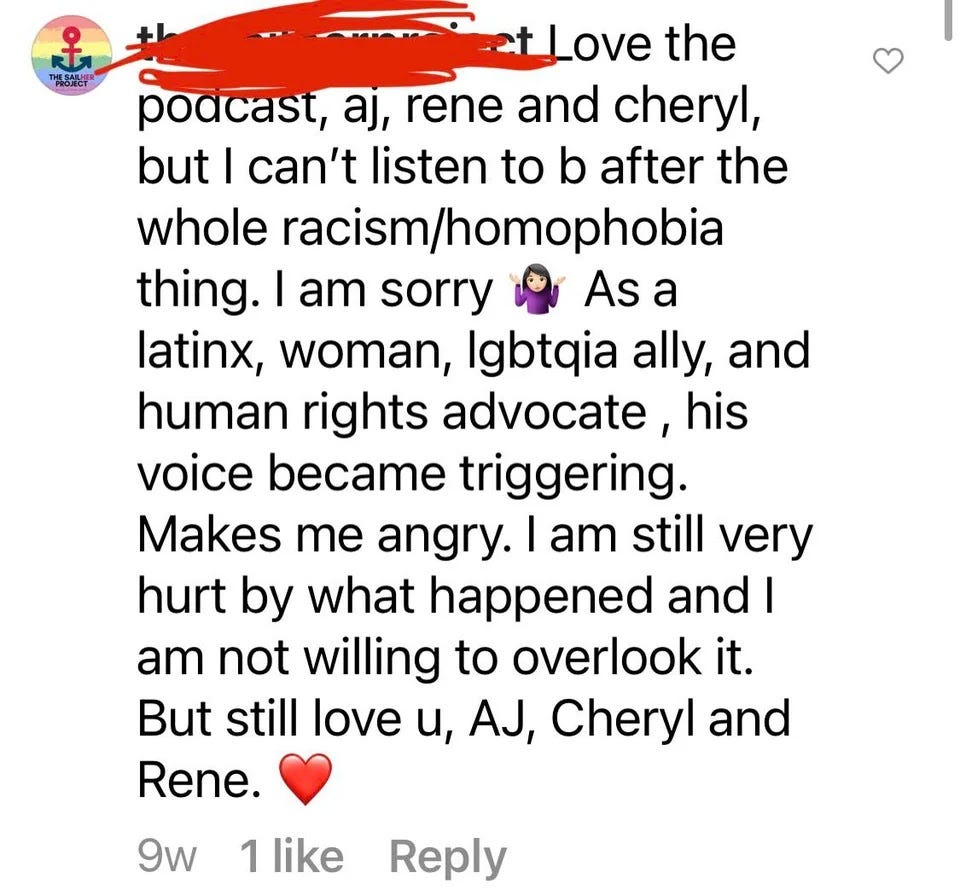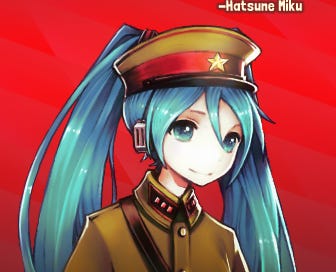Creator Cancellations and Narcissistic Injury
How fans believe they are entitled to their creators having "the correct politics"
Hi everyone, sorry for the absence! I was creatively uninspired over these last few months and it’s only recently when I finally hit a topic which might be good for discussion. Please enjoy this long-awaited piece!
At the height of the Red Scare, a Hollywood Blacklist was created to track individuals in the entertainment industry who were suspected of being Communists, had sympathies for them or simply refusing to cooperate in state investigations on the subject. Individuals who were unfortunate enough to get on the list were at risk of getting their reputations tarnished and their incomes wrecked through studios refusing to hire them. The criteria for getting on the list was often flimsy too, and soon more than a hundred entertainers were blacklisted, including Orson Wells, Burgess Meredith (The Penguin from 1960s Batman), Arthur Miller (playwright and author of The Crucible) and Sam Wanamaker (father of Zoë Wanamaker aka Professor Hooch from Harry Potter).
In the modern era, the Blacklist has returned. However, rather than being afraid of communists, it’s supposed “fascists”, which runs the gamut of “moderate Republican” to “progressive who said the wrong thing on Twitter.” There is an expectation that entertainers should support every progressive cause under the sun, vote for the left-wing party of choice and “be on the right side of history.” If one of them breaks line somehow, they are met with a furious, burning rage and calls for similar punishment to their 1950s counterparts. Rather than political institutions, the people driving the movement are, more often than not, the very same people who will gladly consume the media products these people create.
So what drives fans to do all this?
To blame these fans’ actions solely on social justice ideology (or whatever you choose to call it) is exploring one portion of the equation. Social justice is the ideology which provides a moral framework and legitimises the actions of these fans. For this phenomenon to really take hold, it has to hit these people personally.
And this brings me to my central thesis: fan cancellations against creators who break from the progressive orthodoxy are akin to a narcissistic injury, because on a fundamental level, the creator sharing differing views from the fans is a blow to their own collective egos.
A “narcissistic injury” refers to actions or words inflicted on a narcissist which lands a blow to their pride and self-worth. The narcissist typically explodes in rage and becomes excessively defensive, attacking or deflecting any perceived criticism given onto them.
What makes this behaviour different from the reaction of an emotionally immature person is the capacity for remorse. An emotionally immature person might do something stupid like spread rumours about the other party, but if persuaded or simply takes time to reflect, will feel regret & change their ways. A narcissist, on the other hand, would never be convinced of their wrongdoing and will continue to react in an emotionally disproportionate manner as a way to “maintain” their self-ideal of perfection. Some might engage in mental warfare, while others might resort to more violent means.
A good illustration of a narcissistic injury can be seen in Disney’s Beauty and the Beast (1991), through the character arc of the main antagonist Gaston.
Gaston considers himself the most eligible bachelor in the village and thus feels entitled to marry the main heroine Belle, who is considered the “most beautiful girl.” When Belle remains adamant on not marrying him, Gaston threatens to throw Belle’s father, Maurice, into an insane asylum. He also manipulates the villagers into storming the Beast’s castle, despite Belle’s insistence that the Beast is not a dangerous creature. When neither plan works, Gaston attempts to murder Beast and have Belle all to himself. While Gaston is a fictional character in a fictional situation, his behaviour captures the broad strokes of what a narcissist might do in response to an event which shatters their “perfect” self-image.
With fan cancellations, a similar drive is present. In this case, the self-image maintained is that of “moral purity.” It doesn’t take most people to realise that many fans who are cancel-happy are often self-righteous and believe they are better than everyone else. They are often too eager to signal how righteous they are & how many good causes they support. If not, they believe their status as a certain minority group (race, sexual orientation, gender identity, mental status etc) makes them an inherently righteous person, regardless of the actual contents of their character. Regardless of where this delusion of “purity” comes from, these fans feel entitled to be the moral arbiters of discussion. They don’t just want to control the opinions of other fans, but also the creators who make them.
This feature is mostly a by-product of social media, where the distance between fans and creators is often blurred through online interactions. Because fans seemingly have a bigger say in a media product, it has led to certain contingents of fans to believe they essentially own the media property and are thus entitled to control its direction and production. To quote Kat Rosenfield, “the balance of power between the people who make art and those who consume it has been volatile.”

In a twisted way, the fans love the creators and their products, but only if it fits in line with their ideal of it. Thus, when a creator is perceived to have dissenting views, the fans take it personally. Not only is the creator not “perfect”, but the product they create, the people who worked with them and the fans who continue to love the product become tainted by association. They thus feel compelled to “punish” the creators.
The destructive mentality usually manifests in online harassment campaigns directed towards the creator in question. No matter how vile, cruel and even murderous the words that come out of these people’s mouths/keyboards, it’s all justified: after all, they are the good guys and whatever they say or do will serve the greater good. It’s a-okay for people to assault Dave Chapelle on stage or send death threats to Winston Marshall of Mumford and Sons: it’s punching up to the evil bigots and Nazis!
This vile behaviour is not just extended to the cancelled person, but also their friends, family and associates. It doesn’t matter if the person is known for being kind, a hard worker or an essential member of a group: if your family member, friend or bandmate is a bigot, you have to throw them out immediately because they are Evil(TM) and if you are a good progressive, you will throw them out immediately to prove your loyalty.

As a result of this dichotomous mindset on morality, fans often engage in strange conspiratorial assumptions about the cancelled figure’s character. It’s not enough that they are guilty of one “-ism”, they must have the rest of the package as well. They will twist words and overanalyse statements to try and catch a whiff of the person’s hidden bigotries, in addition to the initial accusation. It’s not enough that Chris Pratt is a homophobe for attending a church that has been alleged to support “conversion therapy,” he must also be an ableist who hates his disabled son from his first marriage and only thinks of women as baby-making machines— all because he thanked his current wife for “giving birth to their healthy daughter”.1
However, perhaps the strangest punishment inflicted on a cancelled person is what I like to call “The Death of the Creator.” Essentially, a group of fans will actively try to pretend that the creator does not exist and the product they produced was created by another person, either a less problematic person associated or even a fictional character with no relation whatsoever. Perhaps the best example of this is the mass disowning of JK Rowling from the Harry Potter franchise. Numerous attempts to pry the Boy Wizard away from the Evil Queen TERF have been made, from the outrageous advertisement which asked fans to “re-imagine the world of Harry Potter without its creator”, the renaming of the real-life Quidditch sport to "quadball”, to Rowling being excluded from the reunion of the movie cast in 2021.
A smaller scale version of this phenomena is the “Hatsune Miku created x” meme, where fans pretend that a franchise created by a “problematic” creator like Minecraft or Five Nights At Freddy’s was instead created by Hatsune Miku (a Vocaloid2 character which somehow became the darling of many terminally online hyper-progressives) or some other person/character who is considered “less problematic.”
While most fans claim that they are joking, I wouldn’t be surprised if many of them secretly hope that a beloved media franchise of their childhood wasn’t created by a problematic person, just so that they could still be allowed to enjoy it.
Even as I compare the behaviour of these fans to that of narcissists, I do not believe the vast majority of fans who engage in this mindset are themselves clinical narcissists. Perhaps the more extreme ones are, but I suspect most people caught up in this are simply victims of a zeitgeist that will eventually blow itself over.
The larger point I’m trying to make here is that the underlying madness of many fan cancellations are a result of fans enmeshing their personal identity and worth with the opinions of their beloved celebrities/creators of beloved franchises. No longer are we allowed to simply like a property or media figure based on our preferences, it has to be part of a grander narrative about how we’re restoring justice to the world by believing in the “correct” ideas, liking the “correct” franchises and worshipping the “correct” figures.
And it is here that I have to acknowledge that this phenomenon is probably not exclusive to progressive fans. Too often, I see people on the “antiwoke” side take personal issue with the opinions of other celebrities or media companies because they are rabid wokies. I even catch myself falling for it sometimes!
However, the cure for this behaviour isn’t just getting rid of the toxic social justice mentality. It’s about separating one’s personal worth away from the actions or beliefs of a famous person or media property you like. You are allowed to disagree, but you shouldn’t let other people from enjoying those same things and you certainly should not lash out against the creator for thinking differently from you, no matter how much you disagree.
In the end, people have to realise that celebrities are, of course, humans and they are allowed to think for themselves and come to their own conclusions on their ideals. They are allowed to be wrong and/or stupid, because humans are.
But, most importantly of all, celebrities are not related to you and probably don’t actually care about you, so you shouldn’t derive your political views or self-worth from their opinions.
Chris Pratt attends Zoe Church, an evangelical church which is supposedly connected to the larger Hillsong Church, which itself has been accused of supporting conversion therapy. Pratt later clarified that he never attended Hillsong at all. The additional accusation comes from the fact that Pratt was married to Anna Faris and had a disabled son with her, but the two eventually divorced and he married Katherine Schwarzenegger, whom he had two healthy-born daughters with. This is despite the fact that Faris remains on good terms with Pratt and Pratt is probably still involved with his son’s life, as he expressed concern that his son might be convinced by these online rumours.
Vocaloid is a voice synthesiser programme which uses “artificial singers” to create songs. Each programme is physically represented by a character drawn anime style and is given a name. Miku is the most popular of all these characters and is essentially the face of the brand.



